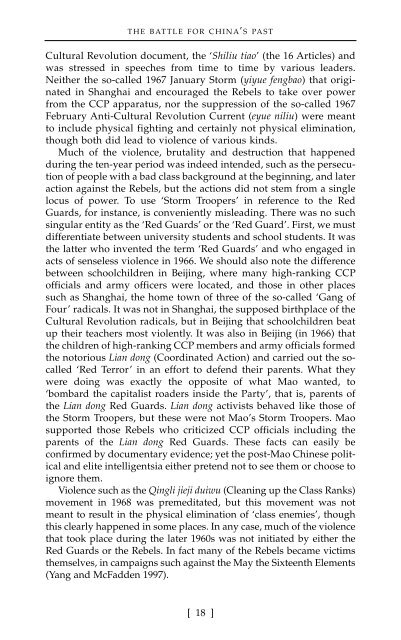Battle for China's Past : Mao and the Cultural Revolution
Battle for China's Past : Mao and the Cultural Revolution
Battle for China's Past : Mao and the Cultural Revolution
Create successful ePaper yourself
Turn your PDF publications into a flip-book with our unique Google optimized e-Paper software.
THE BATTLE FOR CHINA’ S PAST<br />
<strong>Cultural</strong> <strong>Revolution</strong> document, <strong>the</strong> ‘Shiliu tiao’ (<strong>the</strong> 16 Articles) <strong>and</strong><br />
was stressed in speeches from time to time by various leaders.<br />
Nei<strong>the</strong>r <strong>the</strong> so-called 1967 January Storm (yiyue fengbao) that originated<br />
in Shanghai <strong>and</strong> encouraged <strong>the</strong> Rebels to take over power<br />
from <strong>the</strong> CCP apparatus, nor <strong>the</strong> suppression of <strong>the</strong> so-called 1967<br />
February Anti-<strong>Cultural</strong> <strong>Revolution</strong> Current (eyue niliu) were meant<br />
to include physical fighting <strong>and</strong> certainly not physical elimination,<br />
though both did lead to violence of various kinds.<br />
Much of <strong>the</strong> violence, brutality <strong>and</strong> destruction that happened<br />
during <strong>the</strong> ten-year period was indeed intended, such as <strong>the</strong> persecution<br />
of people with a bad class background at <strong>the</strong> beginning, <strong>and</strong> later<br />
action against <strong>the</strong> Rebels, but <strong>the</strong> actions did not stem from a single<br />
locus of power. To use ‘Storm Troopers’ in reference to <strong>the</strong> Red<br />
Guards, <strong>for</strong> instance, is conveniently misleading. There was no such<br />
singular entity as <strong>the</strong> ‘Red Guards’ or <strong>the</strong> ‘Red Guard’. First, we must<br />
differentiate between university students <strong>and</strong> school students. It was<br />
<strong>the</strong> latter who invented <strong>the</strong> term ‘Red Guards’ <strong>and</strong> who engaged in<br />
acts of senseless violence in 1966. We should also note <strong>the</strong> difference<br />
between schoolchildren in Beijing, where many high-ranking CCP<br />
officials <strong>and</strong> army officers were located, <strong>and</strong> those in o<strong>the</strong>r places<br />
such as Shanghai, <strong>the</strong> home town of three of <strong>the</strong> so-called ‘Gang of<br />
Four’ radicals. It was not in Shanghai, <strong>the</strong> supposed birthplace of <strong>the</strong><br />
<strong>Cultural</strong> <strong>Revolution</strong> radicals, but in Beijing that schoolchildren beat<br />
up <strong>the</strong>ir teachers most violently. It was also in Beijing (in 1966) that<br />
<strong>the</strong> children of high-ranking CCP members <strong>and</strong> army officials <strong>for</strong>med<br />
<strong>the</strong> notorious Lian dong (Coordinated Action) <strong>and</strong> carried out <strong>the</strong> socalled<br />
‘Red Terror’ in an ef<strong>for</strong>t to defend <strong>the</strong>ir parents. What <strong>the</strong>y<br />
were doing was exactly <strong>the</strong> opposite of what <strong>Mao</strong> wanted, to<br />
‘bombard <strong>the</strong> capitalist roaders inside <strong>the</strong> Party’, that is, parents of<br />
<strong>the</strong> Lian dong Red Guards. Lian dong activists behaved like those of<br />
<strong>the</strong> Storm Troopers, but <strong>the</strong>se were not <strong>Mao</strong>’s Storm Troopers. <strong>Mao</strong><br />
supported those Rebels who criticized CCP officials including <strong>the</strong><br />
parents of <strong>the</strong> Lian dong Red Guards. These facts can easily be<br />
confirmed by documentary evidence; yet <strong>the</strong> post-<strong>Mao</strong> Chinese political<br />
<strong>and</strong> elite intelligentsia ei<strong>the</strong>r pretend not to see <strong>the</strong>m or choose to<br />
ignore <strong>the</strong>m.<br />
Violence such as <strong>the</strong> Qingli jieji duiwu (Cleaning up <strong>the</strong> Class Ranks)<br />
movement in 1968 was premeditated, but this movement was not<br />
meant to result in <strong>the</strong> physical elimination of ‘class enemies’, though<br />
this clearly happened in some places. In any case, much of <strong>the</strong> violence<br />
that took place during <strong>the</strong> later 1960s was not initiated by ei<strong>the</strong>r <strong>the</strong><br />
Red Guards or <strong>the</strong> Rebels. In fact many of <strong>the</strong> Rebels became victims<br />
<strong>the</strong>mselves, in campaigns such against <strong>the</strong> May <strong>the</strong> Sixteenth Elements<br />
(Yang <strong>and</strong> McFadden 1997).<br />
[ 18 ]
















